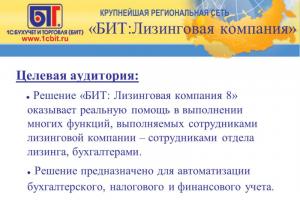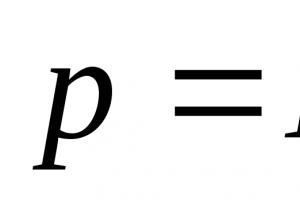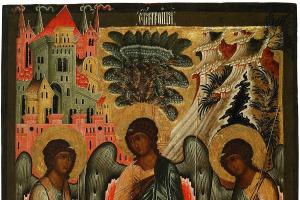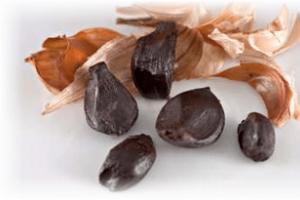How to determine the gender of nouns?
Correctly determining the gender of nouns allows you to avoid errors in their agreement with verbs in the past tense form ( the coffee has cooled down or cooled down) and adjectives ( the coffee is delicious or delicious).
Since most often the grammatical gender of nouns does not correlate directly with lexical meaning words, whether a noun is masculine, neuter or feminine, have to be memorized (memorized). This is most difficult for those who study Russian as a foreign language.
Native speakers of Russian have difficulty defining grammatical gender occur with the following types of words:
- the largest group is indeclinable borrowed nouns: coffee, cocoa, Bordeaux, whiskey, brandy, boa, brie, argot, euro, Esperanto;
- foreign language geographical names: Monaco, Limpopo, Tokyo, Helsinki, Tartu, Capri, Chile, Yellow River;
- abbreviations: UN, UNESCO, NATO, CIS, PRO, VAK, TASS, GLONASS.
- some nouns ending in -Л in the form im. n. (doubts arise whether these words should be attributed to the second or third declension): tulle, callus, polish, roofing felt, valve.
- nouns, plural form including which usually denotes a pair of shoes: shoes, boots, slippers, sandals and so on.
- compound nouns.
Let's look at each of these types of words in more detail.
1. Gender of indeclinable borrowed nouns
Most indeclinable nouns that look similar to indeclinable neuter nouns (such as sea And window), belong to the neuter gender: aromatic cocoa, aged Bordeaux, heady Chardonnay, hot cappuccino, locomotive depot, new coat, wicker flowerpot.
Word coffee strict literary norm prescribes the use of a masculine noun: the strong coffee has already cooled down. However, in a relaxed oral speech Neuter gender agreement is acceptable: the coffee is cold.
It should be noted that there are many exceptions to this rule related to the influence of various analogies (such as the presence of a commonly used inflected Russian synonym; the possibility of substituting an inflected word denoting a generic concept, etc.). Thus, the words are masculine Euro(since most names of monetary units are masculine, cf.: dollar, ruble, pound, franc, tugrik...), bri, suluguni(the influence of the generic concept cheese), sirocco(the influence of the word wind), penalty(influence of the Russian synonym penalty kick). The feminine gender includes words Avenue(cf. Street), kohlrabi(cabbage), salami(sausage), etc.
Some words can be used in two genders. Such words include, for example, nouns that look similar to inflected nouns in the plural form. h.: aged whiskey And aged whiskey; Armenian brandy And Armenian brandy. Therefore, in all doubtful cases, to determine the gender of a word, you should consult Russian dictionaries.
2. Gender of foreign speakers geographical names
Most often, the gender of such names is determined by the generic word: distant (principality) Monaco, wide (river) Limpopo, densely populated (city) Tokyo. If you can use two different generic words, then agreement options are possible: independent (state) Haiti, independent (country) Haiti, distant (island) Haiti, beautiful (city) Brescia And beautiful (province) Brescia.
In some cases, the gender of a noun is established by tradition, so a dictionary check is required.
3. Gender of compound words (abbreviations)
The gender of abbreviations is usually determined by the reference word in the decoding of the abbreviation or by the generic word: NATO (alliance) decided, Moscow State University (university) accepted new students, the CIS (commonwealth) took the initiative, UNESCO (organization) declared 2009 the Year of Gogol.
More information about the correct use of abbreviations in the text can be found in the article How to use abbreviations correctly
4. Gender of nouns ending in -Л
The second declension and the masculine gender include, in particular, the following words: aerosol, polish, lampoon, vaudeville, quantile, quartile, endgame, tulle, roofing felt, flat.
The third declension and feminine gender include words such as mezzanine, callus, rosin, vacuole, triplet.
Gender affiliation and belonging to the second or third declension are checked in such cases in dictionary order. For example, you can use dictionaries in the “Word Check” section on our portal.
5. Names of shoes and paired items
Things to remember:
And also: gaiters - one gaiter, leggings - one gaiter, sideburns - one sideburn, leggings - one legging.
BUT: knee socks - one golf, rails - one rail, adjustments - one adjustment.
In addition, there is a bigender noun high boots. If in plural h. The emphasis falls on the end of the word (high boots, -o c), then the form singular -one ounce If in plural h. the emphasis falls on the stem ( u nty), form named after p.un. h. - at nta.
6. Compound nouns
In this lesson we will learn what part of speech is called a “noun”, what a noun means, what genders nouns are, how to determine the gender of a noun and which nouns have no gender.
Noun – part of speech
Understanding the world, our ancestors gave names to surrounding objects and phenomena. Look around - everything is named, everything has its own name. The noun is the oldest and most important part of speech. Let's find out more about her.
A noun is a part of speech that designates an object and answers a question Who? or What?
What does a noun mean?
Nouns include words that are the names of objects. For example: table, ball, book.
All nouns belong to one of three genders:
masculine - horse, boy, dad, governor;
feminine - earth, mother, daughter, rye;
neuter gender - ring, banner, village.

There is also a group of nouns in Russian general kind, which can denote a male or female person:
big (big) sweet tooth, my (my) colleague.
General gender nouns in modern Russian, as a rule, have colloquial stylistic coloring and express an emotionally expressive assessment of disapproval:
crybaby (colloquial), weakling (colloquial, disapproving), drunkard (colloquial), bully (colloquial) etc.;
less often they are stylistically neutral:
cripple (neutral), orphan (neutral) and so on.
Indeclinable nouns of foreign origin distributed by gender as follows:
belong to the masculine gender
names of male persons ( receptionist, entertainer),
names of animals and birds ( kangaroo, flamingo);

feminine gender refers to the names of female persons ( lady, madam);
neuter gender includes inanimate nouns ( muffler, metro).
Exceptions:
the masculine gender includes the words coffee (drink), sirocco (wind), tornado (hurricane), suluguni (cheese), Pashto, Bengali and other names of the languages of the world;
The feminine gender includes:
tsetse (fly), iwasi (herring), kohlrabi (cabbage), salami (sausage);
nouns like protégé, counterpart, hippie, incognito relate both masculine and feminine;
only in plural the word is used blinds.
U indeclinable nouns of foreign origin fluctuations in gender may be observed, with one of the forms being stylistically neutral, and the other is colloquial, for example:
coffee(m.r., neutral) - coffee(Wed. R., colloquial);
mango(average, neutral) - mango(m.r., colloquial);
brandy(average, neutral) - brandy(m.r., colloquial), etc.
The gender of indeclinable proper names of foreign language origin is determined by generic word:
Sochi- m.r. (city); Mississippi- and. R. (river); "Times"- and. R. (newspaper); Ontario- Wed R. (lake).
Genus abbreviations determined by the type of keyword:
VDNH- and. R. (exhibition); All-Russian Exhibition Center- m.r. (center), etc.
Note.
If the abbreviation is inflected, then the gender is determined by the ending, for example: university (-a, -u, -om, -e) - m.r. (cf.: higher education institution).
The gender of indeclinable nouns is indicated syntactically in the forms of adjectives, participles, etc.:
strong coffee; At first Madame followed him, then Monsieur replaced her. (P.)
Pay attention!
Difficulties arise when determining the gender of some nouns; you need to remember them:
tulle, -ya (m.r.), shampoo, -i (m.r.), piano, -i (m.r.), veil, -i (f.r.).
If you have any difficulties, consult a spelling dictionary.
Nouns denoting people and animals can only be masculine or feminine. Genus is determined by the sex of a person or animal:
boy - girl
brother - sister
cat Kitty
Nouns ending in suffixes - yonok are always masculine
child*
kitty*
little bear*
*These words have a diminutive meaning.
There are masculine nouns ending in -a, -ya. These nouns denote male persons:
man
young man
grandfather
uncle
dad
These are also abbreviated male names:
Alexander - Sasha
Alexey – Alyosha
Vladimir - Vova
Dmitry - Dima
Ivan – Vanya
Nikolai - Kolya
Konstantin – Kostya
Peter - Petya
I will remember the feminine gender
And I will say: “She is mine.”
And I will remember the masculine gender
And again I will say: “He is mine.”
Neuter gender: “It is mine.”
This rule is mine!
This little poem will help us correctly determine the gender of nouns.
In this lesson we learned that a noun is a part of speech that denotes an object and answers the questions who? What? Nouns have three genders: masculine, feminine, neuter.
🔥1.4 K times viewedThe main grammatical feature that is inherent in almost every part of speech is the category of gender. How many genders do nouns have and how to correctly determine this category for this part of speech? You will find answers to these and other questions in the article.
What is the gender of nouns?
Category of gender of nouns in Russian– a grammatical sign indicating the gender (gender) of the object (living creature, phenomenon) called by the noun or its absence. Gender is a permanent grammatical feature of nouns and is studied in the 6th grade.
Features of the category of gender of nouns
In Russian there are three types of nouns:
- Male (he). Masculine nouns in the singular I. p. have ending -a, -i, and zero.
Examples of masculine nouns: dad, uncle, knife, table, hawk.
- Female (she). Feminine nouns in the singular I. p. have the endings -a, -я, and zero.
Examples of feminine nouns: wife, nanny, night, glory, desert.
- Average (it). Neuter nouns in the singular I. p. have endings -о, -е.
Examples of neuter nouns: swamp, gold, sun, lake, jam.
There is also a class of words, the so-called general gender, which, depending on the context, can be used in both masculine and feminine genders
(boring, sissy, crybaby, smart, greedy).
TOP 5 articleswho are reading along with this
How to determine the gender of a noun?
For animate nouns, the gender coincides with the gender of a living creature, a person (father, interlocutor - m.r., girlfriend, gossip - f.r.).
For all nouns, gender can be determined by the grammatical form of the adjective, which agrees with the noun:
- Masculine whose? Which? (white snow, good advice);
- Feminine. Nouns agree with adjectives that answer questions - whose? which? (fresh newspaper, cheerful friend);
- Neuter gender. Nouns agree with adjectives that answer questions - whose? which? (green field, tall building).
Test
Article rating
Average rating: 4.6. Total ratings received: 1397.
Gender of nouns
1. What is the gender system of nouns in the Russian language?
All Russian nouns in the form singular can be classified into one of the following genera: male, female, average, general.
2. How to determine the gender of a noun?
The gender of a noun can be determined by agreeing with the pronoun my:
my son, my governor, my curtain, my little house- masculine; my wife, my wall, my night- feminine gender, my window, my sky, my animal- neuter gender.
For most nouns denoting people, gender can be determined by gender: my apprentice, my grandfather(masculine); my mother, my sister(feminine gender).
The gender of nouns is determined by the singular form. Nouns used only in the plural have no gender: manger, pasta, trousers, pitchfork.
3. What nouns belong to the general gender?
Common nouns are nouns that characterize man, give him assessment characteristics; they have endings-and I and belong to the 1st declension:.
slob, ringleader, singer, hard worker, dirty guy, dude, drunkard, sissy, sleepyhead, crybaby Generic nouns can denote both male and female people:
What a slob you are! What a slob you are!
4. How to determine the gender of unchangeable nouns? Gender of immutable nouns, calling people , determined by gender:.
brave hidalgo, refined lady Nouns meaning professions and occupation , are masculine: military attache, night porter . Nouns of the 2nd declension with a zero ending, naming persons by profession ( doctor, professor, associate professor, driver.
etc.), even if used in relation to female persons, are still nouns male Unchangeable nouns that call animals. , belong to the masculine gender, although when indicating a female they can be used as feminine nouns: Australian kangaroo, funny chimpanzee; chimpanzee feeding her babies Exceptions: tsetse(fly),
Ivasi (fish) - feminine. Immutable inanimate, nouns are neuter:. , belong to the masculine gender, although when indicating a female they can be used as feminine nouns: night taxi, delicious stew, new blinds aromatic cocoa, aged Bordeaux, heady Chardonnay, hot cappuccino, locomotive depot, new coat, wicker flowerpot coffee, penalty, sirocco(masculine);
Genus avenue, salami(feminine gender). foreign language geographical names determined by the generic word: distant Monaco(this is a principality, i.e. a neuter noun, which means the word Monaco also neuter) wide Limpopo(river - river), densely populated Tokyo(city - m.r.). If you can use two different generic words, then agreement options are possible: independent Haiti(state - s.r.), independent Haiti(country - female) and distant Haiti(island - m.r.); beautiful Brescia(city - district) and
In the Russian language, the gender of nouns is determined on two grounds: by the ending of the nominative singular and by the meaning of the noun, namely, by the attribution of persons and animals called by this noun to their natural gender. Knowing what gender a particular noun belongs to is necessary in order to correctly change it by case and correctly combine it with other words in a sentence. That is why in dictionaries, gender indications are a mandatory characteristic of nouns.
It is customary to distinguish five groups of noun words according to their gender:
Masculine nouns;
Feminine nouns;
Neuter nouns;
Common nouns;
Nouns whose gender cannot be determined.
TO masculine includes nouns ending in hard consonant stem or at th (house, father, balance, bank, barter, loan, tea, region), all nouns in -tel (teacher, writer, switch, indicator), month names(January, February, April, June, July, September, October, November, December), borrowed nouns with base on -l, -ny, -ry (ensemble, shampoo, piano, lobby, calendar).
TO feminine -and I (wife, land, idea, game, computer science, migration, company, function), nouns ending in soft consonant stem (life, steel, night), as well as nouns ending in hard sizzling (youth, lies, rye, gouache, retouching, nonsense, falsehood, wilderness).
TO neuter include nouns ending -o, -e (window, business, field, bankruptcy, godlessness, good, wealth, department, religion, application, lending, distribution), as well as all nouns in -me (time, crown, burden, stirrup, udder, name, banner, flame, tribe, seed) and noun child .
The exception is nouns ending -and I and nouns ending in zero soft consonant, which are masculine because they denote male persons: uncle, young man, Muscovite, cabin boy, bear. TO masculine also applies to noun journeyman .
To nouns general kind include words denoting persons both male and female and usually having evaluative meaning: crybaby, bully, smart girl, good fellow, greedy, glutton, sleepyhead, sneak.
General nouns denoting males agree with the masculine forms of adjectives, pronouns and past tense or subjunctive verbs, and nouns denoting females agree with the corresponding feminine forms. Wed: He's so smart! She's so smart! What a crybaby our Seryozha is! What a crybaby our Masha is! He is an orphan. She is an orphan. My colleague carefully read the documents. My colleague carefully read the documents.
It is necessary to distinguish the use of words of a general gender from nouns with an evaluative meaning, but not related to words of a general gender and characterizing a person, cf.: bungler(common gender: What a bungler Misha! What a bungler Masha!)– hat(feminine gender: What a hat our Misha is! What a hat is our Masha!); cunning(common gender: What a cunning Kolya! What a cunning Olya!)– fox(feminine gender: What a fox our Kolya is!).
When determining the gender of nouns denoting persons and animals, it is very important to take into account the natural gender of the latter:
TO masculine male persons and animals: grandfather, father, uncle, bull, horse, lion;
- nouns that mean names of persons by occupation: educator, doctor, teacher, lawyer, judge, engineer, banker, manager, entrepreneur, systems engineer, assistant, director, head;
- To feminine are nouns that mean female persons and animals: aunt, niece, granddaughter, mother, actress, wolf, lioness, bear, sheep, goat, chicken.
Considerable difficulties arise when using nouns denoting persons by occupation or profession.
Masculine nouns denoting male and female persons doctor, engineer, technologist, banker, assistant, manager, businessman, as a rule, they agree with adjectives in the masculine form (i.e., by ending), and with verbs - in the masculine or feminine form, depending on whether the person is male or female (i.e., by meaning). For example: Experienced lawyer Ivanova won the case.– Experienced lawyer Ivanov won the case; The local doctor Smirnova visited the patient.– The local doctor Smirnov visited the patient.
In Russian there are nouns, the genus of which cannot be determined. These include words Not having singular forms: cream, ink, memoirs, sleigh, scissors, trousers, vacations, chess, name days, christenings, wakes, farewells, Cordillera, Sochi.
Considerable difficulties in the aspect of speech culture are presented by nouns (usually borrowed from other languages) that do not change by case. (highway, subway, coffee and etc.). They're called unyielding. Attempts to change such words lead to gross errors like: He returned for his coat. The gender of such words cannot be determined by the ending; it is determined by the meaning of the word, associated in most cases with the concept animate/inanimate.
Most inanimate indeclinable nouns are neuter words (foyer, cinema, coat, highway, khaki, pince-nez, bouclé).
Animate indeclinable nouns can be either masculine or feminine, depending on the gender they denote, that is, they relate to the gender of a real person or animal. Wed: a magnificent maestro, a military attache, a famous impresario, a charming lady, a courteous lady; my counterpart– my counterpart; your protégé– your protégé; gray kangaroo– gray kangaroo, bright cockatoo– bright cockatoo.
From this general rule there are exceptions:
1) indeclinable nouns that have a generic name in the Russian language correspond to the gender of the latter: salami- and. R. (sausage), kohlrabi- and. R. (cabbage);
2) sometimes the gender of an indeclinable noun is determined by the gender of the word, which is common and inflected for such nouns: Avenue is defined as a feminine noun because it corresponds to a feminine noun that is inflected street, argo– with a synonymous masculine noun jargon, suluguni– with a masculine noun (cheese), aloe– m.r. (flower), Hindi– m.r. (language), Capri– m.r. (island), Mississippi- and. R. (river), Tbilisi– m.r. (city);
3) noun coffee– masculine, although in Lately V colloquial speech it is permissible to use it as a neuter noun: tasty coffee And delicious coffee, one coffee And one coffee;
4) the names of the letters refer to neuter words: Russian A, capital B; names of sounds – neuter or masculine: unstressed A– unstressed A; Note names are neuter: long E;
5) the gender of complex abbreviated indeclinable nouns depends, as a rule, on the gender of the reference word of the phrase: UN- and. R. (Organization United Nations), RGPU– m.r. (Russian State Pedagogical university).
In the Russian language, nouns are actively used, which are formed as a result of adding two words. Such compound nouns can be animate or inanimate (Governor General, female astronaut, conference room). For animate nouns, gender is determined by the word indicating the gender of the person (female astronaut- and. R.; miracle hero– m.r.). In inanimate nouns, gender is determined by the gender of the first word. (museum-apartment– m.r.; robe dress- Wed R.; amphibious aircraft– m.r.; boarding school- and. R.). If a compound noun contains an indeclinable noun, then the gender is determined by the gender of the inflected word (cafe-dining room- and. R.; comedy-buff- and. R.; taxi car– m.r.).
Gender of nouns formed using suffixes -ish-, -ishk-, determined by the gender of the noun from which these nouns are derived (voice – little voice: m.r.; oar – oar looking for e: Wed R.; snake - snake looking for A: and. R.; Brother - Brother ish ka: m.r.; letter - letters ish to: Wed R; newspaper - newspaper: w. R.).








